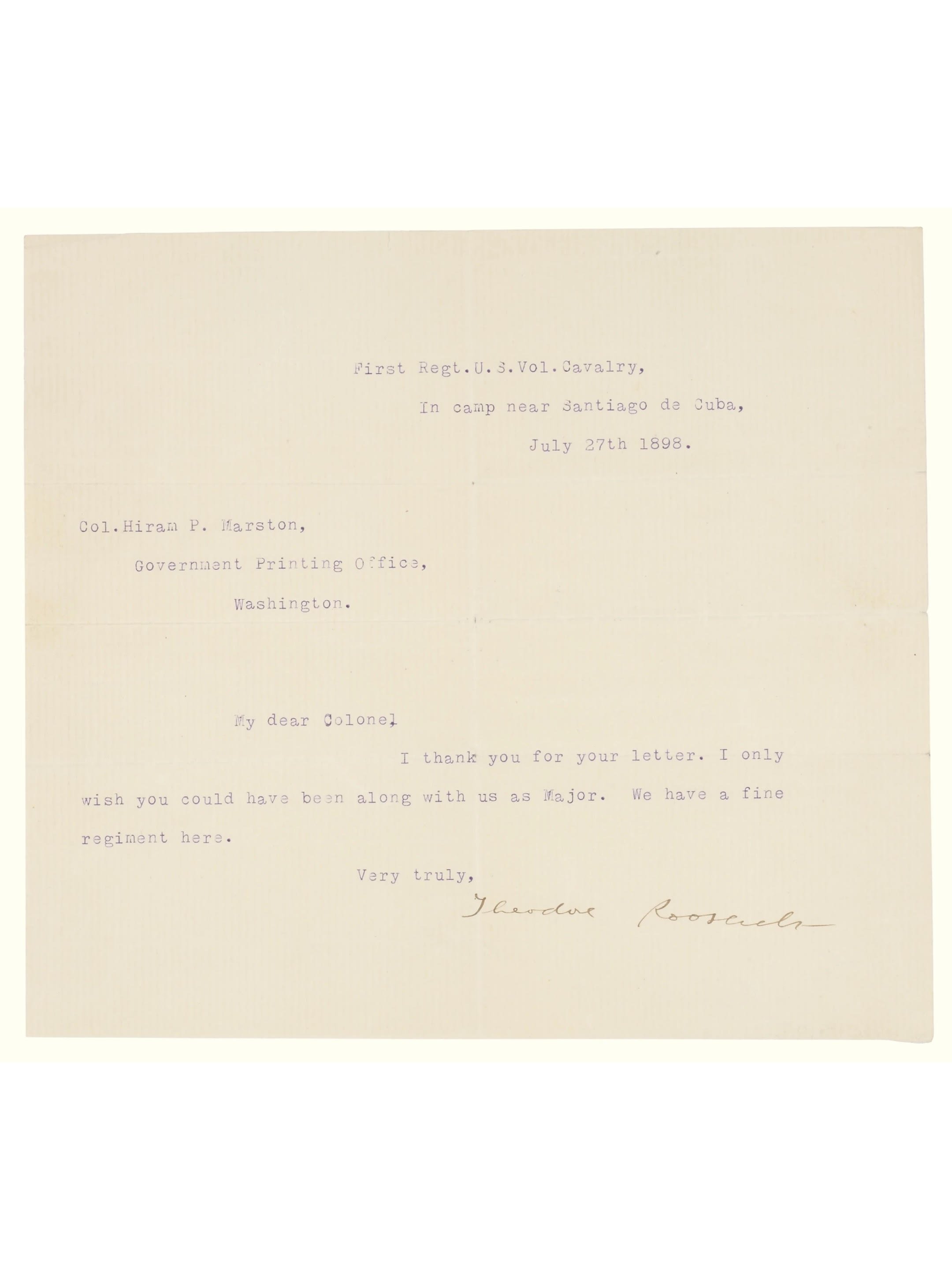 Image 1 of
Image 1 of


Theodore Roosevelt 1898 Typed Letter Signed - Sent From Cuba While Serving With The Rough Riders
26th President.
Typed letter signed “T. Roosevelt”, July 27, 1898, headed "First Regt. U.S. Vol. Cavalry, In camp near Santiago de Cuba", 8×7.5, to Colonel Hiram P. Marston at the Government Printing Office, in full:
I thank you for your letter. I only wish you could have been along with us as Major. We have a fine regiment here.
By the time of the writing of the present letter, peace negotiations between the U.S. and Spain had begun, leading to the signing of the Treaty of Paris in early December of 1898, bringing an end to the Spanish-American War. President McKinley was holding the U.S. Army in Cuba during the negotiations, despite the protestations of senior officers reporting that yellow fever and malaria had begun spreading dangerously rapidly among the units. At the end of July, Roosevelt drafted a "round-robin"--an open letter signed by a number of commanders disapproving of the War Department policy--and gave it to the U.S. press who, on August 4, made it national news. It is doubtful that the round-robin had much impact on the health of the soldiers, since Secretary of War Russell Alger had already ordered Navy ships to retrieve the troops on August 3, but the scandal, together with the victory at the Battle of San Juan Hill, surely helped to paint a picture of Roosevelt as a man of action in the eyes of the public.
The RAREST and most desirable time period for Roosevelt.
26th President.
Typed letter signed “T. Roosevelt”, July 27, 1898, headed "First Regt. U.S. Vol. Cavalry, In camp near Santiago de Cuba", 8×7.5, to Colonel Hiram P. Marston at the Government Printing Office, in full:
I thank you for your letter. I only wish you could have been along with us as Major. We have a fine regiment here.
By the time of the writing of the present letter, peace negotiations between the U.S. and Spain had begun, leading to the signing of the Treaty of Paris in early December of 1898, bringing an end to the Spanish-American War. President McKinley was holding the U.S. Army in Cuba during the negotiations, despite the protestations of senior officers reporting that yellow fever and malaria had begun spreading dangerously rapidly among the units. At the end of July, Roosevelt drafted a "round-robin"--an open letter signed by a number of commanders disapproving of the War Department policy--and gave it to the U.S. press who, on August 4, made it national news. It is doubtful that the round-robin had much impact on the health of the soldiers, since Secretary of War Russell Alger had already ordered Navy ships to retrieve the troops on August 3, but the scandal, together with the victory at the Battle of San Juan Hill, surely helped to paint a picture of Roosevelt as a man of action in the eyes of the public.
The RAREST and most desirable time period for Roosevelt.
26th President.
Typed letter signed “T. Roosevelt”, July 27, 1898, headed "First Regt. U.S. Vol. Cavalry, In camp near Santiago de Cuba", 8×7.5, to Colonel Hiram P. Marston at the Government Printing Office, in full:
I thank you for your letter. I only wish you could have been along with us as Major. We have a fine regiment here.
By the time of the writing of the present letter, peace negotiations between the U.S. and Spain had begun, leading to the signing of the Treaty of Paris in early December of 1898, bringing an end to the Spanish-American War. President McKinley was holding the U.S. Army in Cuba during the negotiations, despite the protestations of senior officers reporting that yellow fever and malaria had begun spreading dangerously rapidly among the units. At the end of July, Roosevelt drafted a "round-robin"--an open letter signed by a number of commanders disapproving of the War Department policy--and gave it to the U.S. press who, on August 4, made it national news. It is doubtful that the round-robin had much impact on the health of the soldiers, since Secretary of War Russell Alger had already ordered Navy ships to retrieve the troops on August 3, but the scandal, together with the victory at the Battle of San Juan Hill, surely helped to paint a picture of Roosevelt as a man of action in the eyes of the public.
The RAREST and most desirable time period for Roosevelt.
